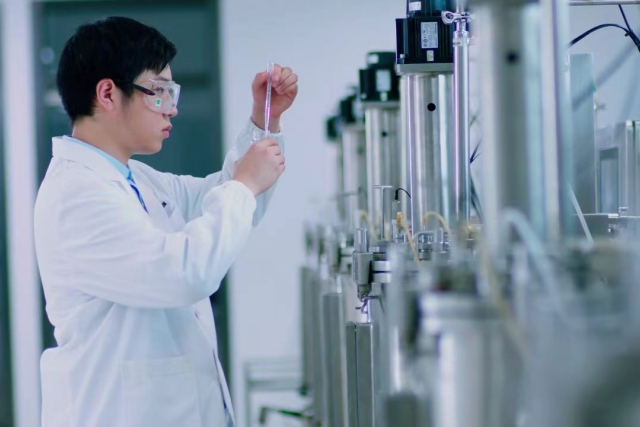-
Home > News & Events > Blog > Enzymes
Transglutaminase (TGase or TG), also known as transglutaminase, is a monomeric protein with an active center composed of 331 amino acids and a molecular weight of approximately 38,000. It is an enzyme that catalyzes acyl transfer in proteins and peptides. TGase can catalyze both intramolecular and intermolecular covalent cross-linking of protein polypeptides, thereby improving the structure and functionality of proteins. It has significant effects on properties such as foaming, emulsifying stability, heat stability, water retention, and gelation ability, leading to improvements in the flavor, texture, consistency, and appearance of food.

Angel Enzyme’s TG enzyme, produced through microbial fermentation, has various beneficial effects in practical applications:
1. Improve food texture. TG enzyme can improve many important properties of proteins by catalyzing cross-linking between protein molecules. For example, when used to produce restructured meat, it can not only bind minced meat together but also cross-link various non-meat proteins onto meat proteins, significantly improving the texture, flavor, and tissue structure of meat products.
2. Enhance the nutritional value of proteins. TG enzyme can covalently cross-link certain essential amino acids (such as lysine) onto proteins to prevent the degradation of amino acids by the Maillard reaction, thus improving the nutritional value of proteins. Transglutaminase can also introduce the lacking amino acids into proteins with suboptimal amino acid composition.
3. Formation of heat-resistant and water-resistant films. Casein protein cross-linked by the enzyme can be dehydrated to obtain water-insoluble films. These films can be hydrolyzed by pancreatic chymotrypsin and are edible, making them suitable as food packaging materials.
4. TG enzyme also possesses some unique effects. After treatment with TG, protein gel formation can occur without the need for heat treatment. It can enhance the elasticity and water-holding capacity of food. TG enzyme can also be used for encapsulating lipids or fat-soluble substances.
In addition, the TG enzyme products developed by Angel Enzyme have some unique characteristics that make their application field safer and broader:
1. Safe to use: Since TG enzyme is widely present in animal tissues, people have been consuming food containing lysine isopeptide bonds catalyzed by TG enzyme. Therefore, novel foods produced using TG enzyme are not only safe for human consumption but also beneficial for human health.
2. Strong adhesive properties: Covalent bonds formed between proteins catalyzed by TG enzyme are difficult to break under typical non-enzymatic conditions. Therefore, food components treated with this enzyme exhibit strong adhesive properties. When applied to minced meat, for example, it remains intact even after freezing, slicing, and cooking.
3. Good pH stability: The optimal pH for TG enzyme activity is around 6-7, but it retains high activity within the range of pH 5-8. When the pH drops below 5, the enzyme activity rapidly decreases, and when the pH exceeds 8 but is below 9, the enzyme activity slowly declines. This pH stability aligns well with the pH values typically found in protein food systems, making it suitable for application in food production.
4. Strong heat stability: Research has shown that the optimal temperature for TG enzyme activity is around 52°C, and it retains high activity within the range of 42-57°C. Particularly in protein food systems, the enzyme exhibits significantly improved heat stability, ensuring it does not rapidly deactivate during typical food processing involving heat treatment.
5. Inverse relationship between reaction temperature (within the range of enzyme activity) and time: Higher reaction temperatures result in shorter reaction times, while lower temperatures require longer reaction times. The relationship between temperature and time in the reaction process is determined by the physicochemical characteristics of different types of food.
In summary, Angel Enzyme’s TG enzyme can be widely applied in various areas such as meatballs, restructured minced meat, fish paste products, sausages (ham sausage, grilled sausage), plant-based meats, noodles, bread, as well as in fields like tofu and cheese. Angel Enzyme's TG enzyme has demonstrated its importance in enhancing the texture, flavor, tissue structure, and nutritional aspects of meat products.
About Annzyme®:
Annzyme is a new brand for Angel enzymes products. We are dedicated to providing customers with perfect solutions in many fields like baking, proteolysis, nucleic acid hydrolysis, starch further-processing etc, and already built highly automated production lines for enzymes and other biological products. We are committed to become the best enzymes supplier and service provider.
About Angel:
Angel Yeast Company is a high-tech listed company specializing in yeast and biotech. Product business covers Yeast and Baking, Yeast Extract-Savoury, Nutrition & Health and Biotechnology fields. It is one of the world's leading companies in the yeast industry. Angel has 12 holding subsidiaries and provides products and services for more than 150 countries and regions.
Press contact:
Angel Yeast Co., Ltd.
Address: 168 Chengdong Avenue, Yichang, Hubei, P. R. China
Tel: +86-717-6369520
Fax: +86-717-6370680
Email: aie@angelyeast.com




